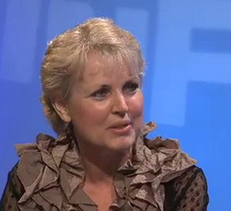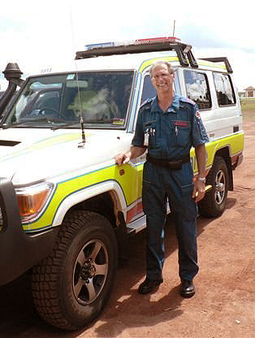Jomnin's founders
Jomnin is a group of health professionals, business people and food professionals who have had many years experience living and working in developing countries.
They see the pitfalls in our current model of international aid and look for innovative ways to invest in Cambodia and support its development.
They see the pitfalls in our current model of international aid and look for innovative ways to invest in Cambodia and support its development.
Dr Kamrang & Ross McKenzie
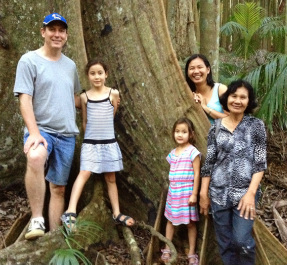
Dr Kamrang Mckenzie was born in a small village in Siem Reap, Cambodia in 1980. She moved with her family to Phnom Penh when she was little where she completed all of her schooling and medical training. Kamrang chose to study medicine because she wanted to work in a helping profession. She worked for 5 years as a general practitioner before moving to Australia with her husband, Ross and their two daughters. Kamrang believes that one of the biggest health needs in Cambodia is care of the elderly. There are few services available to care for the complex needs of elderly people.
"I would love to see profits from the Vissot industry helping to care for our 'munooh juh joreah' (elderly people) because, unfortunately, it is difficult to raise funds for services to old people." Kamrang plans to return to Cambodia to help in the future healthland health centre and especially to work with the elderly.
Ross McKenzie grew up in a small country town. He travelled, worked and studied for a few years after graduating from high school before ending up in Cambodia. He was only planning to be in Cambodia for a year doing volunteer work but ended up there for 10 years involved with Healthland, helping to teach English, working with staff and developing products. "It was probably the hardest and most challenging time of my life but I wouldn't trade the experience for anything." He is passionate about giving people opportunities to work and develop their unique skills and loves to see young people get ahead and help to lift their families out of poverty. Ross is currently studying a Batchelor of Medicine degree at the University of Newcastle. Through Jomnin, he wants to continue to support the Cambodian people to grow their own industry and serve their own people.
"I would love to see profits from the Vissot industry helping to care for our 'munooh juh joreah' (elderly people) because, unfortunately, it is difficult to raise funds for services to old people." Kamrang plans to return to Cambodia to help in the future healthland health centre and especially to work with the elderly.
Ross McKenzie grew up in a small country town. He travelled, worked and studied for a few years after graduating from high school before ending up in Cambodia. He was only planning to be in Cambodia for a year doing volunteer work but ended up there for 10 years involved with Healthland, helping to teach English, working with staff and developing products. "It was probably the hardest and most challenging time of my life but I wouldn't trade the experience for anything." He is passionate about giving people opportunities to work and develop their unique skills and loves to see young people get ahead and help to lift their families out of poverty. Ross is currently studying a Batchelor of Medicine degree at the University of Newcastle. Through Jomnin, he wants to continue to support the Cambodian people to grow their own industry and serve their own people.
Sonnthida Sambath
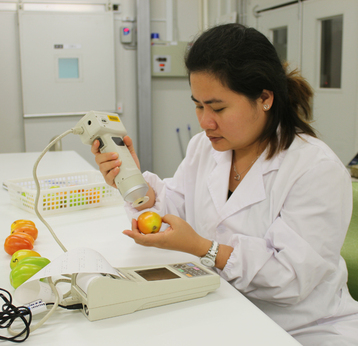
Thida was born in the Prey Veng Province of Cambodia but moved to Phnom Penh when she was 16 to study Ago-Industry at university. After graduation Thida worked as assistant researcher at the Cambodian Agriculture Research and Development Institute (CARDI) where she worked closely with farmers and helped them to integrate postharvest practice and management in order to improve crop quality and reduce harvest losses. This gave the farmers security and safety as well as increased profitability.
In 2011 Thida was granted a scholarship to pursue a Doctor of Philosopy in Food Science in Australia. She is currently studying at the University of Newcastle where she is learning about current trends in the food industry, supply and demand and customer needs. She sees many ways in which her knowledge can be adapted to conditions in Cambodia.
Thida says, "The food industry in Cambodia has moved slower than neighbouring nations like Thailand and Vietnam so it is important to encourage industry and bring products up to an international standard to satisfy market requirements." Thida believes that her knowledge and skills will be an asset to the flourishing food industry in Cambodia.
In 2011 Thida was granted a scholarship to pursue a Doctor of Philosopy in Food Science in Australia. She is currently studying at the University of Newcastle where she is learning about current trends in the food industry, supply and demand and customer needs. She sees many ways in which her knowledge can be adapted to conditions in Cambodia.
Thida says, "The food industry in Cambodia has moved slower than neighbouring nations like Thailand and Vietnam so it is important to encourage industry and bring products up to an international standard to satisfy market requirements." Thida believes that her knowledge and skills will be an asset to the flourishing food industry in Cambodia.
James & Michelle Ward
Dr Julianne Millar
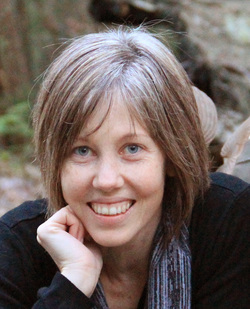
Julianne was born in the Solomon Islands and spent her early years in Papua New Guinea. Her family moved to Cambodia in 1992 where her father worked for the Adventist Development and Relief Agency, an international non-government organisation.
Julianne is a practicing GP and has a heart for service. She chose to become a doctor so that she could help others. She has worked with Medecins Sans Frontieres (an international medical organisation) in Kenya, Pakistan and Ethiopia, as well as joining short-term medical teams in Vanuatu, Cambodia and the Solomon Islands.
Julianne says, "I recently returned to Cambodia in 2013 and the rapid modernisation in Phnom Penh and Siem Reap is very evident. Some of this development is trickling out to the rural areas, but mostly there is very little infrastructure. Subsistence living means the rural population are vulnerable to natural disasters such as fire, flooding, and drought, as well as ill-health. The gap between the urban middle-class and rural poor is certainly widening. Balancing the development to extend throughout Cambodia is a major challenge. Furthermore, there are increasingly well-educated young people who lack opportunities within Cambodia."
Julianne feels that the best way to help Cambodia is to empower the people to improve their own country using whatever skills and resources they possess. They need more industries to provide employment and training. Ongoing education in health principles, especially in the rural areas, is badly needed.
Julianne is a practicing GP and has a heart for service. She chose to become a doctor so that she could help others. She has worked with Medecins Sans Frontieres (an international medical organisation) in Kenya, Pakistan and Ethiopia, as well as joining short-term medical teams in Vanuatu, Cambodia and the Solomon Islands.
Julianne says, "I recently returned to Cambodia in 2013 and the rapid modernisation in Phnom Penh and Siem Reap is very evident. Some of this development is trickling out to the rural areas, but mostly there is very little infrastructure. Subsistence living means the rural population are vulnerable to natural disasters such as fire, flooding, and drought, as well as ill-health. The gap between the urban middle-class and rural poor is certainly widening. Balancing the development to extend throughout Cambodia is a major challenge. Furthermore, there are increasingly well-educated young people who lack opportunities within Cambodia."
Julianne feels that the best way to help Cambodia is to empower the people to improve their own country using whatever skills and resources they possess. They need more industries to provide employment and training. Ongoing education in health principles, especially in the rural areas, is badly needed.
